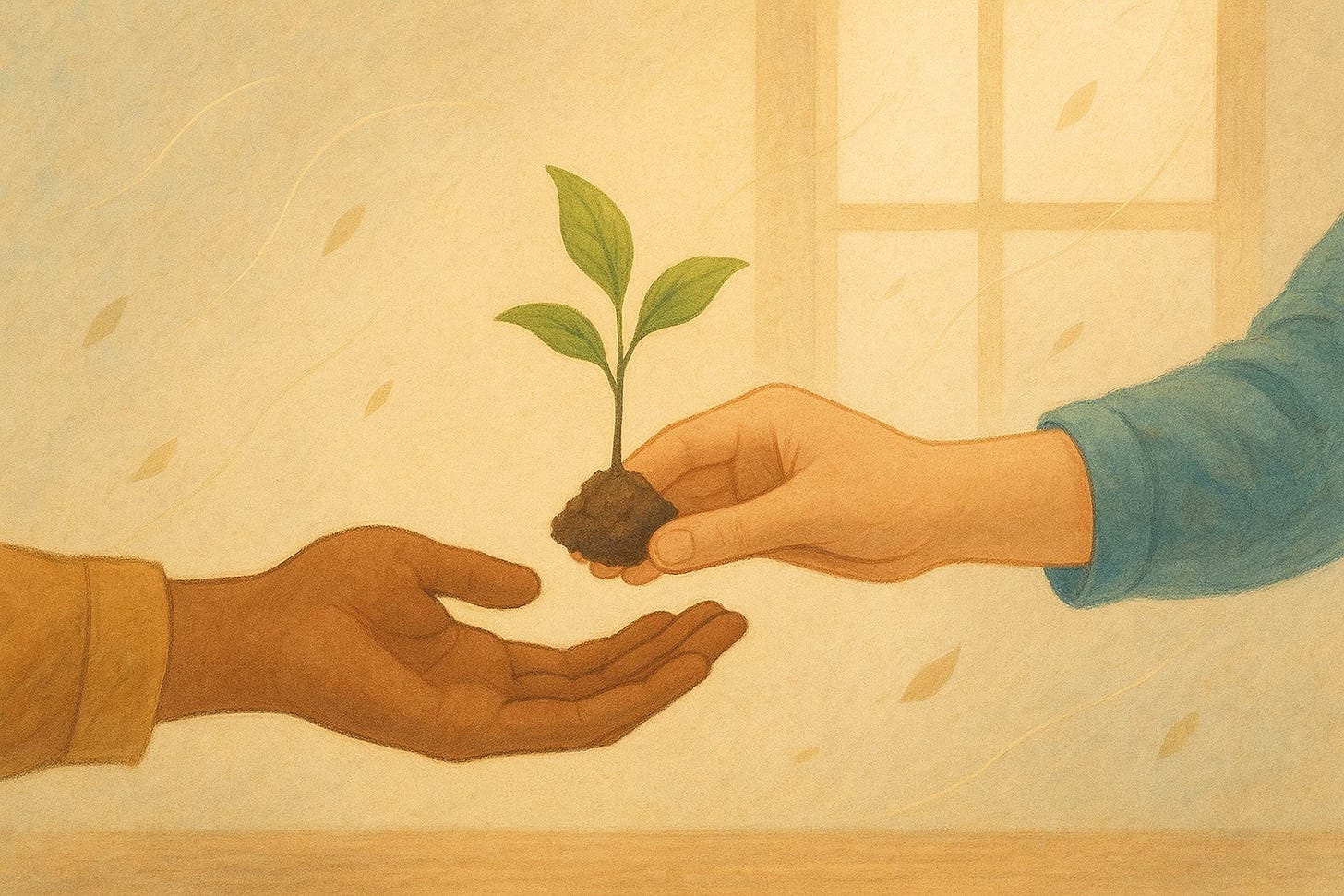An endless pursuit of innovation
I continue to research the power of communities to keep us grounded in the digital age–this time as I travel through Rome and Croatia seeking ideas, examples, and inspiration to lead us forward.
This is a reader-supported newsletter. If you find value in my work, please consider becoming a paid subscriber. I offer talks in of many kinds—speeches, panels, Q&As, virtually or in person—for organizations and founders. If you're working on something, let me know if I can help. If I can, I will.
Carol and I are on vacation in Italy and Croatia, viewing art, riding bicycles, consuming history, and eating well. Along the way, I’m looking for stories of innovation and community. I’ll share what I find as Substack Notes, available only on the Substack app. If you don’t yet have the app, it’s easy to download. You’ll find instructions here. Substack can also read each post aloud, which is handy if you’d rather listen than read.
What follows is a reprint of my very first newsletter edition, preceded by a few new thoughts on how its message continues to shape my work. The central theme is this: Customers want help, and they will forgive missteps when your efforts are sincere—when you're trying to help them flourish. I call this “the grace to innovate,” a term I learned from Sharon Newport. That idea feels especially relevant now, as I travel through Rome, where a new pope is leading the Catholic Church on a mission that could benefit every one of us, in every community, all around the world. As always, I welcome your thoughts. Feel free to leave a comment below.
The grace to innovate
We are living through epochal times, at the dawn of a new age shaped by artificial intelligence. When I wrote my first edition, we were all just trying to survive COVID. That moment demanded a kind of honesty, a push to help each other through a shared threat, and a call to do business differently. It revealed the value of not just showing up, but of showing up with purpose—not only striving for sales or scale, but leading with care, doing business not just efficiently or effectively, but humanly.
In the years ahead, artificial intelligence will change everything. It already is. AI may act as a copilot, coach, teacher, or therapist. It may augment our efforts, helping us work faster, perform better, and spend less. Or it may replace us, driven by the irresistible pull of economic gain. I believe it will do all of these things.
That’s why I’m advocating for communities as essential institutions in the digital age. Communities create value by helping us do what makes us human: connect with each other, with food and water, with energy and work, with the places we call home, and with ourselves. These connections aren't sentimental. They’re essential. As AI advances, communities may become the most powerful—and perhaps the only—institutions capable of helping us remember how to be fully human. They’re where we come together to do what we cannot do alone.
Now more than ever, we can offer each other the grace to innovate—as workers, owners, citizens, neighbors, activists, leaders, and friends—by joining in to help our communities flourish.
To explore how this grace is unfolding today, I reconnected with Sydney Berry, a leader in the professional beauty industry. In my very first edition, Sydney described how salons and stylists were hit hard by COVID closures, prompting quick pivots like pop-up B2C sites, supported by manufacturers and distributors, to help professionals generate income and stay afloat. Now, she sees an even broader role for salons, one that builds on their cultural history and community presence:
Communities are where ideas can flourish, rippling and compounding, nurtured by a shared sense of place and purpose. Salons originated in 17th-century France as gatherings where people exchanged ideas, art, and conversation. Today’s beauty salons can echo that tradition. Some are expanding their role as community hubs, hosting discussions and offering services that support well-being for clients and citizens alike.
Inspired by Sydney, and traveling with eyes wide open, I’m looking for ideas, examples, and sparks of possibility as I walk the ancient streets of Rome and bicycle the roads of Croatia.
I’m also working on a future edition that will more fully introduce a new project I’ve begun to sketch out: What if a community—my community, and maybe yours—decided to eat its way to better health and well-being? Read Catalyzing community for more on this.
We can go a long way together. And we will—if we choose to help communities flourish by helping them innovate. If we commit to creating new value—not just through markets or technologies, but through the human connections that make communities work. Communities can ignite our potential, root us in purpose, and lead us forward in the digital age.
If you have stories about grace and innovation, or tips on what I should see, learn, eat, or experience in Italy or Croatia, I’d love to hear from you. Help me reimagine this newsletter as a field guide for community innovation by sharing your ideas and feedback. Leave a comment, message me, or reach out directly at mark.dancer@n4bi.com.
Together, let’s build thriving communities—one innovation at a time.
Please read on…
Customers want your help
Are you acting on the "grace to innovate" that they are granting?
Welcome to my first newsletter edition on innovating B2B. I believe that B2B companies can play an outsized role in how we all live our lives and do our work, especially as our economy and society transform for the digital age. Each week, I will share ideas and work to create new foresight about the future of business. I invite you to join this journey by offering your comments, asking questions, sharing your experiences, and helping to advance our conversation. You can reach me at mark.dancer@n4bi.com.
Innovating through grace
One of the great unnoticed trends of the COVID-19 pandemic is that customers grant grace for suppliers to innovate. The pandemic is a very human crisis, and as businesses struggle to survive, customers expect a very human response. Showing up matters. Commitment is rewarded. Working through uncertainty means that not every solution will win—at least not without trial and error. The best B2B companies are leaning in, acting without hesitation, and doing business as humans for humans. Leaders are strengthening customer relationships, opening new opportunities, and emerging more potent than before. Followers are reveling in caution, getting by, and hoping that business returns to normal. Leaders are winning the future; followers are losing it.
This week, I discussed these trends with Sharon Newport, CAE, organizational consultant, and adjunct professor at Georgetown University’s Institute for Transformational Leadership. Sharon opened my eyes to many new ideas for B2B innovations—all centered on a very human approach to business relationships and organizational change.
As Sharon explained: “Grace is a courteous goodwill, offered with kindness by customers, with the expectation that new solutions are attempted and made better through collaboration.” Just as the pandemic is creating unprecedented challenges for businesses and the people who define them, so is the realization that new solutions are mandatory. “Grace is a mission to transform; to do business differently. And an acknowledgment that it may be impossible to get it right the first time,” Sharon also said. Trying is rewarded. Not trying is noticed.
Perhaps the most common signpost validating Sharon’s perspective is customer acceptance of virtual calls in place of face-to-face meetings. In my conversations with B2B leaders, I found that Zoom calls are necessary—a kind of table stake for achieving social distancing and minimizing the spread of infections. More powerful innovators leveraged virtual communications as a platform, enabling the creation of new value for customers. (For more and deeper insights, see McKinsey & Company’s excellent research, including COVID-19: Implications for Business.)
Sydney Berry, owner of Salon Services, a wholesale distributor of professional salon and spa products serving licensed beauty professionals, noticed the immediate need to shift customer visits to virtual calls and help her salespeople master the associated technology and communication skills. But stepping up meant more was required. Sydney explained that: “As soon as the pandemic hit, salons were closed, and stylists were prevented from earning a living. Our first opportunity was to offer a B2C website for fulfillment, processing, and delivery so that stylists could generate money and survive.” Salon services continued to push ahead, recognizing that stylists carried the weight of their client’s pandemic worries, even as they struggled with their mental health. “We arranged for renowned experts in counseling and therapy, Dr. Deanna Davis, Natasha Cerere, and Jay Williams, to share behavioral tools for building resiliency by way of virtual education,” Sydney told me.
Salon Services’ very human approach to helping its customers created new connections on a very personal level. And it helped strengthen the distributor’s culture by building strength, resolve, and purpose among the company’s staff. Doing business as humans for humans is a way of doing business to survive the pandemic, but it also represents new values that will carry forward toward the future of business as the pandemic wanes. (Sydney’s story and many others are explored in my just-released e-chapter, Distribution Leans In: Stories of Resiliency and Innovation During the COVID-19 pandemic, available here.)
Ideas for innovating B2B
Digging deeper into Sharon and Sydney’s perspectives on pandemic innovations, I offer three ideas that may serve as emerging priorities for innovating B2B:
Your business is your product. A business model does not define B2B companies as distributors, manufacturers, technology vendors, or virtual platforms. Instead, they are defined by their willingness and ability to help their customers survive the pandemic and to prospect as our markets, economy, and society evolve.
Relationship fragility is a choice. B2B innovators often tell me that there is a massive downside for failed implementations. Every customer’s priority is to maintain business continuity. Change creates doubt, and customer relationships are inherently fragile. The new course for B2B companies is to generate resilient customer relationships by investing in human outcomes over self-centered business metrics. For example, taking actions that encourage customers to trust your business is more powerful than focusing on repeat purchases or “share of wallet.”
Communities are a business asset. Building communities and engaging customers are actions that are fast becoming “mission one” for marketing and sales, replacing self-interested methods for segmenting customers and targeting sales. Communities are living things; the best B2B communities are built around shared values, and they work toward mutual betterment. Segments are dead things, defined through data analytics and antiseptic market research.
If customers are offering grace for innovations by B2B companies, acting on grace is more than just surviving the pandemic—it is the start of a movement toward a more human-first practice of business innovation. Technology is essential, and digital technologies are creating exponential gains for B2B businesses and their customers. But I have noticed a trend: As more and more of our work is done in the virtual world, standards are rising for what is delivered in the real world.
The most powerful future for B2B innovators is about doing business as humans for humans. It’s about acting on the aspirations and concerns of customers as humans that work in an organization, enabling people to gain dignity through work as they accumulate experiences and wealth. It’s also about adopting “future of learning” principles for continued education, empowering teams through shared data and technology platforms, and developing leaders with equal capabilities around business savvy and human empathy.
Join the journey
Thank you for reading my first newsletter on innovating B2B. I look forward to your comments, feedback, and suggestions. We have a long road ahead, and this first newsletter is only the beginning. I look forward to making the journey with you, looking for signposts of change, and setting milestones for achieving progress. Don’t be a stranger. Share your comments. If you like, reach out directly at mark.dancer@n4bi.com.



